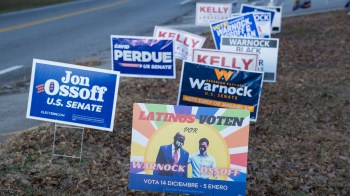Before reform, cards play with interest
TEXT OF STORY
STEVE CHIOTAKIS: Perish the poor soul who gets one of those letters in the mail. It’ll cost more to carry a balance on that Visa or American Express.
Or how about the new fee if you don’t carry a balance. While credit card reform is on its way, it can’t get here soon enough for some. Meantime, banks are trying to make adjustments as quickly as they can. And that has the ears of Congress.
Marketplace’s Nancy Marshall Genzer explains.
Nancy Marshall Genzer: John Bartolac is signing the credit card slip at a jewelry kiosk in Washington’s Union Station. He just bought a necklace and earrings. He’s careful with his card. Still, he got a letter recently from his bank saying his interest rate was nearly doubling, to almost 20 percent. He called to complain and got a lower rate. Still, he was mad.
John Bartolac: I was still upset with it, because I’m a loyal customer, and I’ve been paying on time.
A lot of loyal customers are upset with their credit card companies. The Pew Charitable Trusts just released a report that says advertised interest rates rose an average of 20 percent in the first half of this year. The rate on some cards jumped to 30 percent. Pew studied almost 400 credit cards. Nearly all of them imposed penalties that will soon be illegal under credit card reform legislation — things like jacking up your interest rate for a late payment and never rolling it back. Or applying payments to low interest debt first, so things you charged at the highest rate stay on your bill.
Nick Bourke: I think maybe the rates are going up now, and they’re going up so steeply, in part because the credit card companies are trying to get in, before the new law takes effect.
Nick Bourke manages Pew’s Safe Credit Cards Project. Congress is considering legislation that would move up the credit card reforms to Dec. 1. Banks say that wouldn’t give them enough time to update their computers to comply with the law, even though it was passed last spring.
Scott Talbott is a banking industry lobbyist.
Scott Talbott: I think it would almost impossible for the industry to comply. We don’t have final regulations relating to specific details of how to implement the new law. And we have computer software, and training and disclosures that have to be changed.
Congress is also considering legislation that would freeze interest rates immediately. Banks say that would cut into their profits and force them to lend less money.
Talbott defends the interest rate increases. He says they’re necessary because so many people are out of work, there’s a greater risk they won’t pay their bills. But the banks’ critics say they’re jacking up rates almost across the board. And some card companies are starting to hit consumers with fees, because they pay off their cards every month.
David Parsons: Credit cards are the work of the devil.
That’s David Parsons, retiree from Bloomington, Ind. You guessed it. He got a letter from his credit card company. They’re raising his interest rate by 75 percent.
Parsons: It’s like they’re asking the consumer to cover their butts. It’s just not the way I think business should be done.
So, how do you fight back? Call Congress, says Robert Manning, author of “Credit Card Nation.”
Robert Manning: Americans really need to demand now and put pressure on their members of Congress to enact this legislation sooner, rather than later.
And read the fine print on that letter from your credit card company.
In Washington, I’m Nancy Marshall Genzer for Marketplace Money.
There’s a lot happening in the world. Through it all, Marketplace is here for you.
You rely on Marketplace to break down the world’s events and tell you how it affects you in a fact-based, approachable way. We rely on your financial support to keep making that possible.
Your donation today powers the independent journalism that you rely on. For just $5/month, you can help sustain Marketplace so we can keep reporting on the things that matter to you.


















